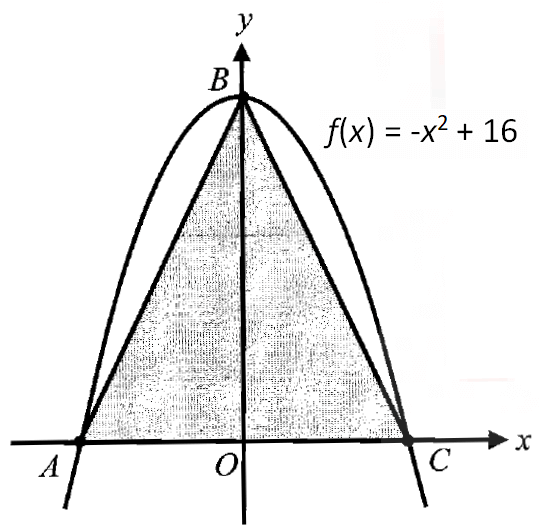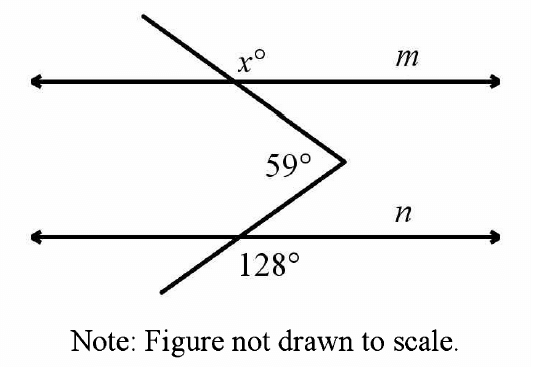PROVE THE GIVEN TRIANGLES ARE SIMILAR USING AA SIMILARITY THEOREM
If two pairs of corresponding angles in a pair of triangles are congruent, then the triangles are similar.
We know this because if two angle pairs are the same, then the third pair must also be equal. When the three angle pairs are all equal, the three pairs of sides must also be in proportion.
Prove that the given triangles are similar using AA theorem :
Example 1 :
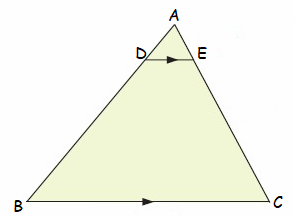
Solution :
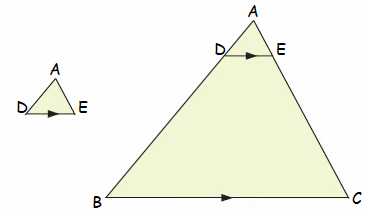
Given :
DE || BC
To Prove :
∆ADE ~ ∆ABC
Proof :
In ∆ADE and ∆ABC
<ADE = <ABC
<AEC = <ACB
(corresponding angles are congruent)
So, ∆ADE and ∆ABC are similar.
Example 2 :
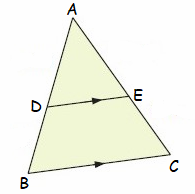
Solution :
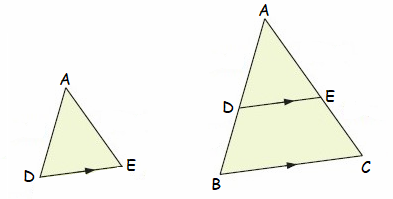
Given :
DE || BC
To Prove :
∆ADE ~ ∆ABC
Proof :
In ∆ADE and ∆ABC
<ADE = <ABC
<AEC = <ACB
(corresponding angles are congruent)
So, ∆ADE and ∆ABC are similar.
Example 3 :
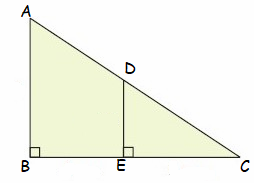
Solution :
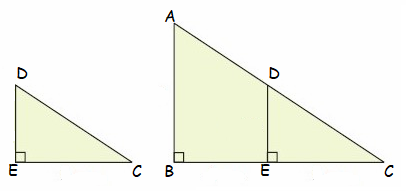
Given :
DE || AB
To Prove :
∆DEC ~ ∆ABC
Proof :
In ∆DEC and ∆ABC
<DEC = <ABC (90 degree)
<DCE = <ACB (common)
So, ∆DEC and ∆ABC are similar.
Example 4 :
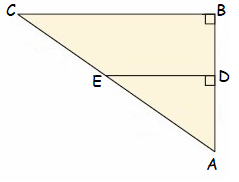
Solution :
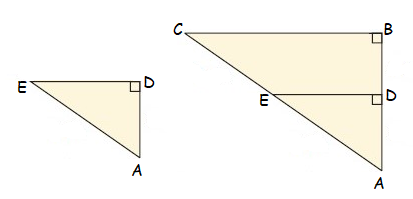
Given :
DE || BC
To Prove :
∆ADE ~ ∆ABC
Proof :
In ∆ADE and ∆ABC
<ADE = <ABC
<EAD = <CAB
So, ∆ADE and ∆ABC are similar.
Example 5 :
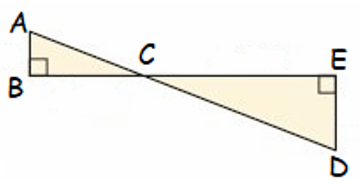
Solution :
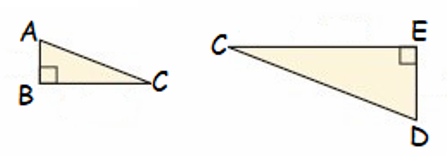
Given :
AB || DE
To Prove :
∆ABC ~ ∆DEC
Proof :
In ∆ABC and ∆DEC
<ABC = <DEC (90 degree)
<ACB = <ECD (vertically opposite angles)
So, ∆ABC and ∆DEC are similar.
Hence, it is proved.
Example 6 :
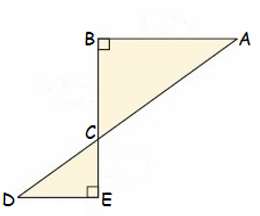
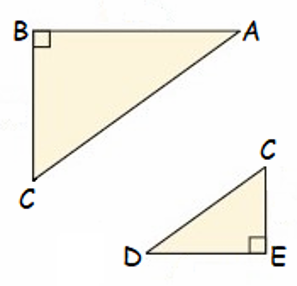
Given :
AB || DE
To Prove :
∆ABC ~ ∆DEC
Proof :
In ∆ABC and ∆DEC
<ABC = <DEC (90 degree)
<DCE = <BCA (vertically opposite angles)
So, ∆ABC and ∆DEC are similar.
Example 7 :
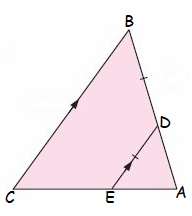
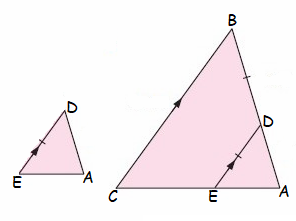
Given :
DE || BC
To Prove :
∆ADE ~ ∆ABC
Proof :
In ∆ADE and ∆ABC
<ADE = <ABC
<EAD = <CAB
So, ∆ADE and ∆ABC are similar.
Example 8 :
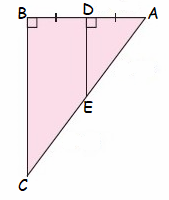
Solution :
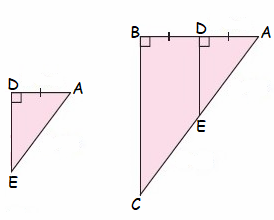
Given :
DE || BC
To Prove :
∆ADE ~ ∆ABC
Proof :
In ∆ADE and ∆ABC
<ADE = <ABC (90 degree)
<DAE = <BAC (common)
So, ∆ADE and ∆ABC are similar.
Example 9 :
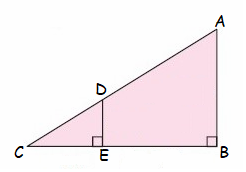
Solution :
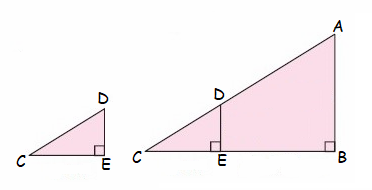
Given :
DE || AB
To Prove :
∆DEC ~ ∆ABC
Proof :
In ∆DEC and ∆ABC
<DEC = <ABC (90 degree)
<DCE = <ABC (common)
So, ∆DEC and ∆ABC are similar.
Explain how you know whether the triangles are similar. If possible, find the indicated length
Example 10 :
Find AC
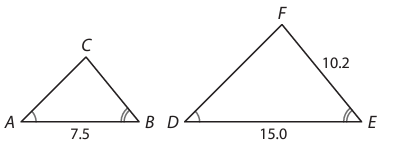
Solution :
<CAB = <FDE
<CBA = <FED
Using AA triangles ABC and DEF are similar.
BC/EF = AC/FD = AB/DE
BC/10.2 = AC/FD = 7.5/15
BC/10.2 = 7.5/15
BC = (7.5/15)(10.2)
BC = 5.1
AC/FD = 7.5/15
From the given information, AC is not possible to find.
Example 11 :
A flag pole casts a shadow that is 50 feet long. At the same time, a woman standing nearby who is 5 feet 4 inches tall casts a shadow that is 40 inches long. How tall is the flag pole to the nearest foot?
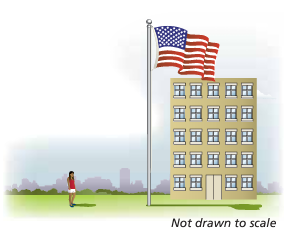
Solution :
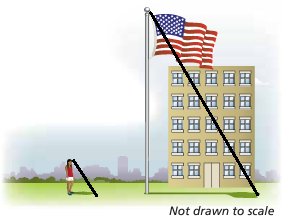
The triangles are similar.
Height of women = 5 feet 4 inches
1 feet = 12 inches
5 feet = 60 inches
5 feet 4 inches = 60 + 4 ==> 64 inches
height of women / height of flag pole = length of shadow of women / length of shadow of flag pole
Let x be the height of flagpole.
64/x = 40/50
64(50) = 40x
x = 3200/40
x = 80 feet.
So, height of flag pole is 80 feet.
Example 12 :
The shaded area is to be an industrial zone. Find the area of the industrial zone. Assume that King and Queen are parallel and that all streets and the track are straight.
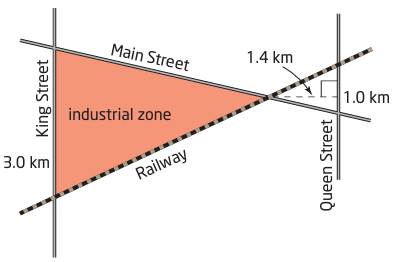
Solution :
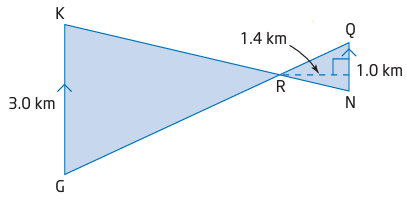
KG and QN are parallel.
<KRG = <QRN
<GKR = <QNR
<KGR = <RQN
The triangles are similar. Since the triangles are similar, the corresponding sides will be in the same ratio.
KG/QN = 3/1
Corresponding sides be a and b. a : b = 3 : 1
Area will be in the ratio 32 : 12
Area of large triangle = 1/2 x base x height
= (1/2) x 3 x height
= 1.5(height)
Area of small triangle = 1/2 x 1 x 1.4
= 0.7
1.5(height) / 0.7 = 9/1
1.5(height) = 9(0.7)
height = 9(0.7)/1.5
= 4.2
Applying 4.2 in 1.5 (height), we get 1.5(4.2) which is 6.3 cm2.
So, the area of industrial region is 6.3 cm2.
Example 13 :
a) Show why PQR is similar to STR.
b) Find the lengths x and y.
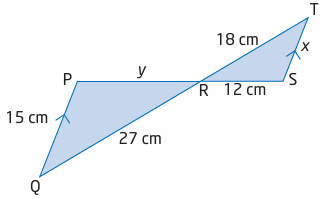
Solution :
<PRQ = <TRS (vertically opposite angles)
PQ and TS are parallel.
<PQR = <RTS (alternate interior angles)
Triangles PRQ and TRS are similar on AA. Comparing the ratio of corresponding sides.
PQ/TS = PR/RS = QR/TR
15/x = y/12 = 27/18
|
15/x = 27/18 27x = 15(18) x = 15(18)/27 x = 10 |
y/12 = 27/18 18y = 27(12) y = 27(12) / 18 y = 18 |
So, the required values of x and y are 10 and 18 respectively.
Kindly mail your feedback to v4formath@gmail.com
We always appreciate your feedback.
©All rights reserved. onlinemath4all.com
Recent Articles
-
Digital SAT Math Problems and Solutions (Part - 143)
Apr 13, 25 12:01 PM
Digital SAT Math Problems and Solutions (Part - 143) -
Quadratic Equation Problems with Solutions
Apr 12, 25 08:21 PM
Quadratic Equation Problems with Solutions -
Digital SAT Math Problems and Solutions (Part - 142)
Apr 11, 25 06:26 PM
Digital SAT Math Problems and Solutions (Part - 142)
